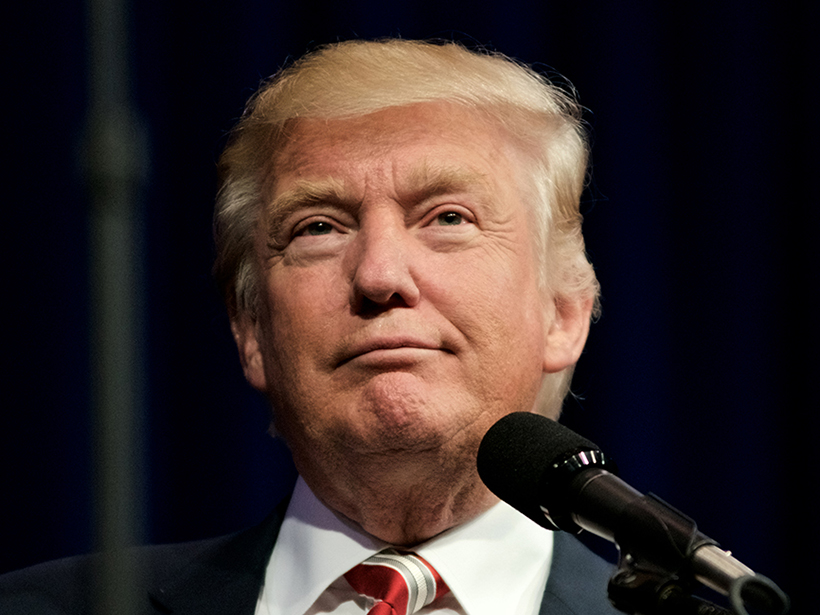Trump inauguration: where to for property and the economy?

This year will no doubt prove to be very interesting for commercial property and global economy, not least because of Donald Trump’s inauguration on January 20.
While it’s a big event for the US, the size of its economy as well as its political importance means that impacts will be felt throughout the world. Commercial property is no exception.
The US economy is powering – 2017 to be a good year
Trump has inherited a strong economy. Now almost a decade after the Global Financial Crisis, unemployment is down, GDP growth is up and interest rates are increasing to keep a lid on activity. Strong economic growth attracts money to commercial property as better tenant conditions promise better rental growth, more development occurs and ultimately this supports greater capital growth.
How will Trump impact commercial markets in the US? Many of the policies Trump outlined during his campaign are positive to the business world. Lower taxes, a simpler tax system and less regulation allow businesses to grow and support the demand for office and industrial space. Consumers will also be better off as the economy grows, spending more and supporting retail. So far, so good. 2017 should be a good year. It is beyond 2017 that things could become unstuck.
China, Mexico and trade
A key Trump election promise was to increase tariffs and this could turn around the positive economic outlook for the US. The countries targeted are Mexico (tariffs of 35%) and China (tariffs of 45%). In doing so, Trump is hoping to grow the US manufacturing sector.
There are a lot of problems with this. The first initial impact is that the cost of importing will increase. The US can’t increase its manufacturing capacity immediately and therefore the costs to consumers will increase. The next impact is that the cost of imported raw materials will increase. This, combined with the higher labour costs in the US, means the cost of locally produced goods will be far higher, again impacting consumers.

US firms will need to consider the merits of moving their operations overseas.
The third impact is that Mexico and China could retaliate with tariffs of their own. It will become more difficult for the US to export to these countries, reducing demand for US goods and potentially services and eventually impacting employment. Fewer jobs, higher inflation and lower levels of spending capacity could cause US economic growth to grind to a halt.
The impacts of these tariffs are, of course, also negative to China and Mexico but also to the rest of the world. Less production in these countries impacts industrial property and fewer exports impacts warehousing. Lower economic growth cuts across all commercial property types, from people occupying offices to people spending in shops. Higher prices are not great news for anyone. It is not surprising that most economists are such strong advocates of free trade.
Repatriation of US firms
To stop companies offshoring, another Trump election promise was to increase taxes for US companies that move operations overseas. US companies move some of their operations overseas for a number of reasons. While for some, lower taxes are a likely benefit, for most, drivers such as access to local markets, lower cost of labour or access to the right type of labour are likely to be more important. The impact of this policy will therefore depend on how high the taxes are set, as well as political pressures large companies are put under to move jobs back to the US.
The impact is likely to be initially positive for US employment but over time the benefits are likely to fade
The impact of this policy has the potential to impact global office and industrial markets, particularly in those areas in which US firms prefer to locate. Manufacturing in Asia is likely to be impacted, as well as regional hubs such as Singapore. London, already experiencing challenges from Brexit, is likely to be further impacted if large US firms move jobs home.
The impact is likely to be initially positive for US employment but over time the benefits are likely to fade as large US companies become less competitive or miss out from being located outside of key markets.
Changing nature of safe haven markets
The US is considered one of the safest markets in the world in which to invest in commercial property. It is not surprising that Manhattan regularly tops the list as the city attracting the most cross border capital. A key part of this reputation is low political risk. As an offshore investor in the US, you can be pretty confident that your investment is safe and you will get your money back if you decide to sell. Planning regulation is reasonably clear and the rights of tenants well set out.
With economic growth now occurring, this gives further reason to invest in the US. Although it is not yet clear whether Trump will change regulation regarding offshore investment, policies such as increasing tariffs and reducing migration suggest a Government that is intent on closing, rather than opening borders. If this is the case, the safe haven nature of US commercial property markets will be compromised.
It’s early days
Right now, the policies that will be set out by the new Trump administration are yet to be announced. There is speculation that the higher tariffs, higher taxes on companies that offshore and changes to migration that Trump outlined during the election campaign will not eventuate, perhaps being blocked by Congress, the Commerce Department, the US International Trade Commission or some other Government department. There is no doubt that property owners exposed to US markets, investments or companies will be watching any policy changes closely.







